I’ve just returned from Cubaconf in Havana, which was also my first visit to Cuba. It was a great trip and I’ve got enough material for at least four blog posts. Most of them won’t deal with free and open source software, so I’ll put them up on my personal blog and I’ll add links here when they are done..
Cubaconf is in its second year, and while I really wish they would have called it “Cuba Libré” (grin) it was a good conference.
There is a spectrum within the Free, Libré, Open Source Software (FLOSS) community, and this is often described by trying to separate the term “open source” from “free software”. If we define “open source” as any software with a license that meets requirements of the Open Source Definition (OSD) and “free software” as any software with a license that meets the requirements of the Four Freedoms, they are the same. You can map the ten requirements of the OSD onto the four requirements of free software.
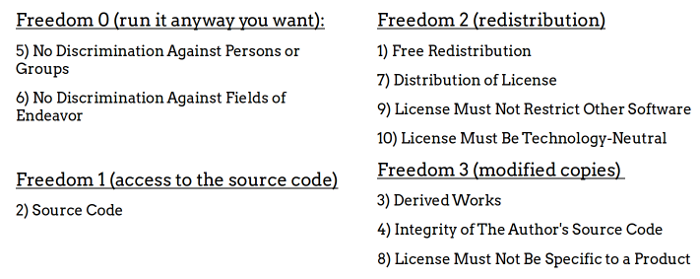
However, it can be useful to separate those who look at FLOSS as simply a development methodology from those who view it as a social movement. When companies like Microsoft and Facebook publish open source software, they are simply looking to gain value for their business that such sharing can create. It’s a development methodology. When people talk about free software, they tend to focus on the “help your neighbor” aspect of it, and this was more the focus of Cubaconf than simply creating new code.
The main thing I discovered on my visit was that Cubans face severe limitations on many things, but I’ve never met a people more determine to do as much as they can to make their situation better, and to do it with such passion. If I had to pick a theme for the conference, that would be it: passionate continuous improvement.

The three day conference had the following structure: Day One was a standard conference with keynotes and five tracks of presentations, Day Two had keynotes and more of a “barcamp” organization, and Day Three was set aside for workshops, as well as the obligatory video game tournament.
They did have the best lanyard sponsor I’ve seen at a technology conference:
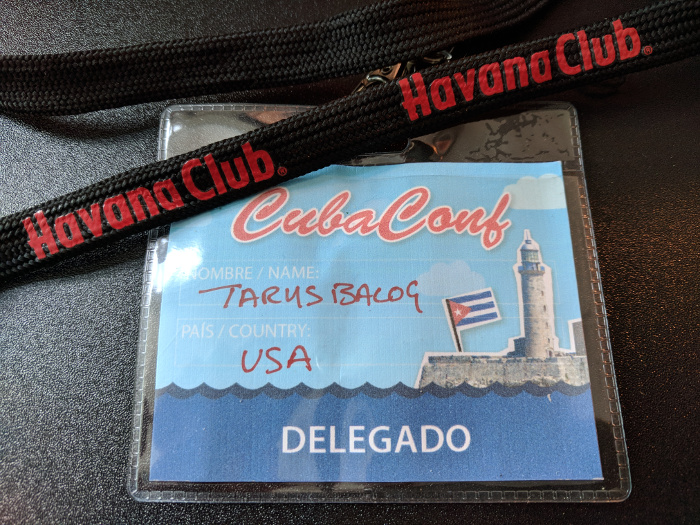
I was in Cuba with my friend and coworker Alejandro, who used to live in Venezuela and is a fluent Spanish speaker, and Elizabeth K. Joseph, who promotes the open source aspects of Mesosphere. We shared a three bedroom “casa particular” in Old Havana, about a ten minute walk from the conference, which was held on the second floor (third floor if you are American) of the Colegio de San Gerónimo.
Everyone was together on the main room for the first keynote.
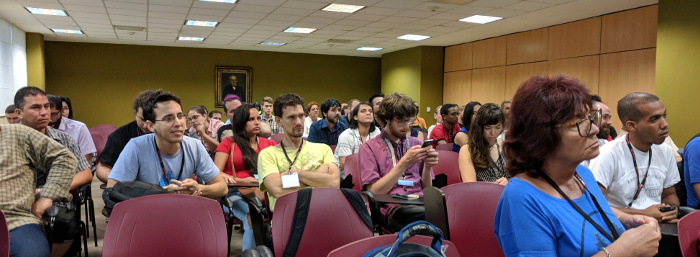
While both English and Spanish were spoken at the conference, the presentations were overwhelmingly in Spanish, which was to be expected. I can get by in Spanish, but the first speaker, Ismael Olea, spoke fast even for the native speakers. At least I could understand most of the content in his slides.
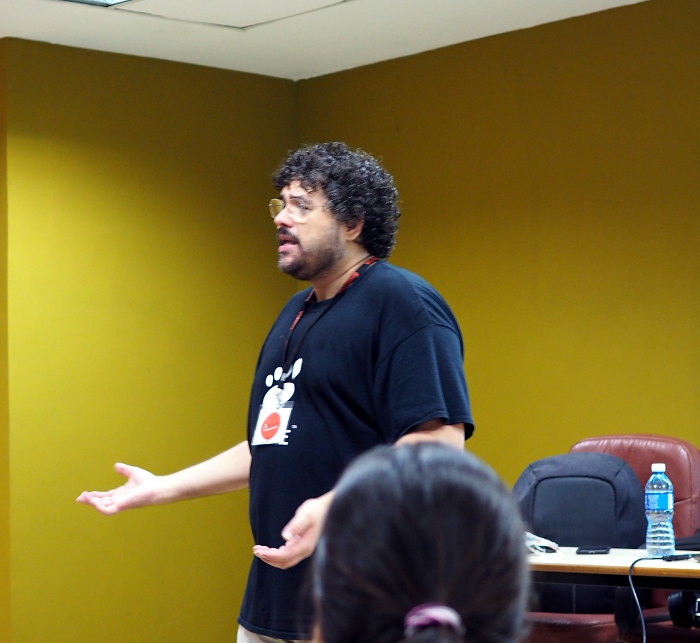
Olea is from Spain and did a keynote on HackLab Almería. Almería is a province in the southeastern part of Spain, and with a population of around 700,000 people it is much smaller than provinces like Madrid (6.5 million) and Barcelona (5.5 million). As such, the region doesn’t get as much attention as the larger provinces, and so they goal of Hacklab Almería is to use technology at the “hyperlocal” level. They define themselves as a “collective of technological , social and creative experimentation” and FLOSS plays a large role in their mission.
After the keynote, we broke up into individual sessions. I went to one called “How to Make Money with Free Software” presented by Valessio Brito from Brazil. While he spoke mainly in Spanish, his slides were in Portuguese, but I was able to follow along. His presentation focused on how he used his knowledge of FLOSS to get consulting engagements around the world. This was pretty topical since in Cuba, as elsewhere, having strong software skills can be lucrative, and since a lot of proprietary software is either impossible to get or too expensive, having skills in open source software is a plus.
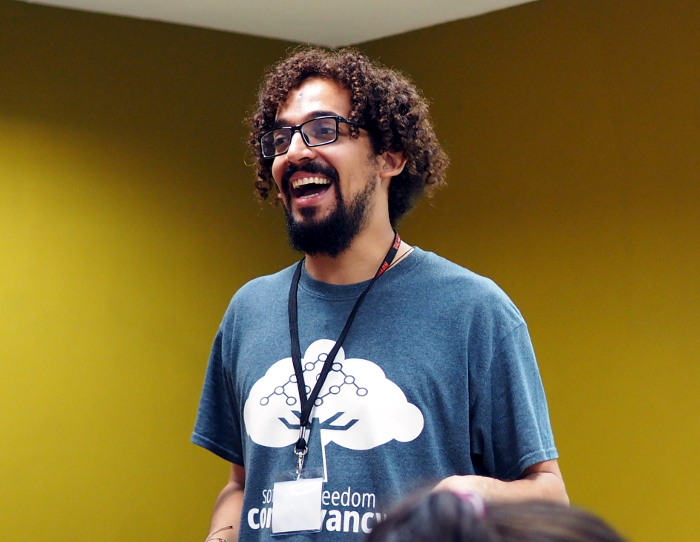
Also, I liked his shirt.
Our OpenNMS presentation was in the next time slot. I asked our hosts if they would like the presentation in English or Spanish, and when they said Spanish I asked Alejandro to give it. He did a great job, even though he had only a short time to understand the slides.
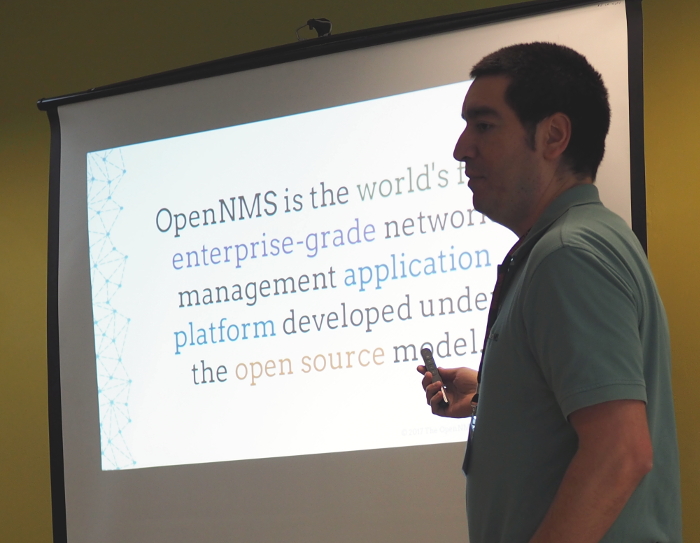
The lunch break came next, and we walked a couple of blocks to the Casa de Africa, a museum dedicated to the African influence in Cuban culture.

We ate sandwiches and talked out on the patio. This would be the location for lunch for all three days.
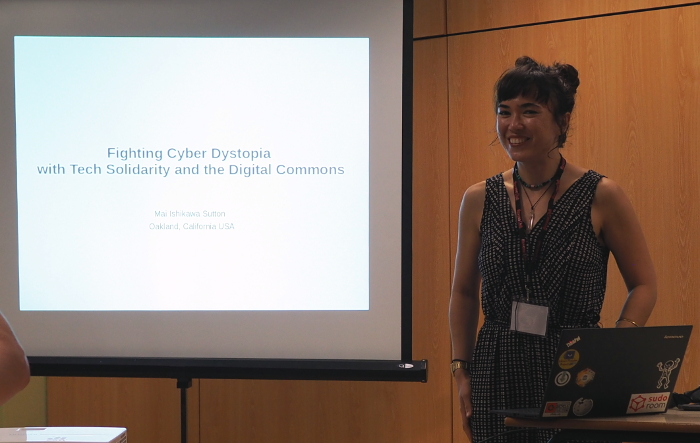
After lunch I watched a presentation by Maira Sutton called “Fighting Cyber Dystopia with Tech Solidarity and the Digital Commons” which is a long way to express the idea of using free software combined with working together to take back some of the power from large corporations. Her main example talked about the city of Austin, Texas, and its fight with Uber and Lyft. Austin wanted all ride sharing drivers to have to undergo a background check that included fingerprints. Sounds reasonable, but Uber and Lyft resisted, eventually leaving the city.
However, services like Uber and Lyft can be downright useful, so a number of startups filled in the gap, offering similar services that met the City’s fingerprint requirements. Instead of acquiescing to local laws, Uber and Lyft took their fight to the State legislature, which overturned Austin’s regulation.
Even though it is a sad ending, the example did demonstrate that combining technology and social action can result in solutions that can meet or exceed those provided by large commercial companies.

For each night of the conference there was an event, and the one for Tuesday was held at a modern art gallery on the southern side of Old Havana. There was lots of food and drink, and I got exposed to a project called cuban.engineer. This is a group to promote technology careers within Cuba, and I had seen their shirts at the conference.
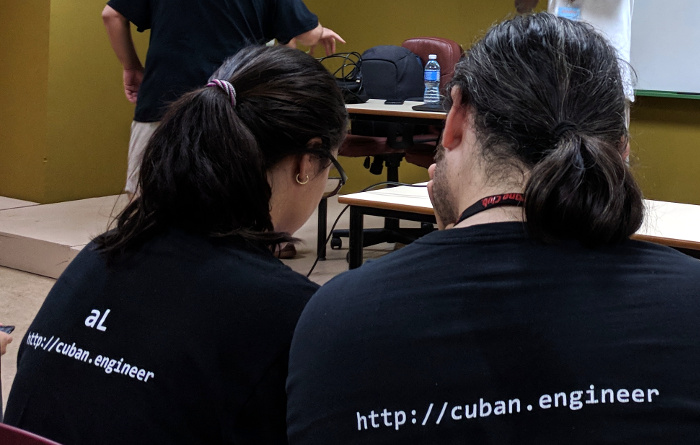
In a lot of the world we take Internet access for granted. I can remember accessing the Internet from the night market in Siem Reap, Cambodia, on an open wi-fi connection. That doesn’t exist in Cuba. Cuba is one of the most disconnected countries in the world, which can make working with technology difficult. Access is controlled by an agency called ETESCA. To access the Internet you purchase a card which offers a certain number of hours of use, and then you have to locate an area with a wi-fi hotspot (usually near a park). The card has a number of digits for a username and a number of digits as a password, and once you get connected you hope you stay connected long enough to do what you need to do.
No one is exempt from this. Even in our apartment the owner would use one of these cards to enable access for the hotspot on the ground floor. So, if you are a technology business in Havana, your first job is to located your office near a hotspot, and then buy a bunch of these cards.
Thus you can imagine that sharing in a big part of the culture. People burn and swap CDs with software such as Ubuntu on them, and they tend to use Gitlab to make local mirrors of code repositories. While wi-fi equipment can be hard to come by, people have been able to set up their own, private wi-fi networks within cities like Havana to make sharing easier. There is no Internet access (I joked that it was Cuba’s “dark web“) but they can set up tools like Rocket.Chat to communicate and share.
Despite limitations in acquiring software, Microsoft Windows is still the most common operating system running on Cuban computers. An attempt was made to create a Cuba focused Linux-based distro called Nova. I was told that they even experimented with making it look as close to Windows 7 as possible, but people were still tied to using Windows. According to Wikipedia this distro is no more, which is a shame.
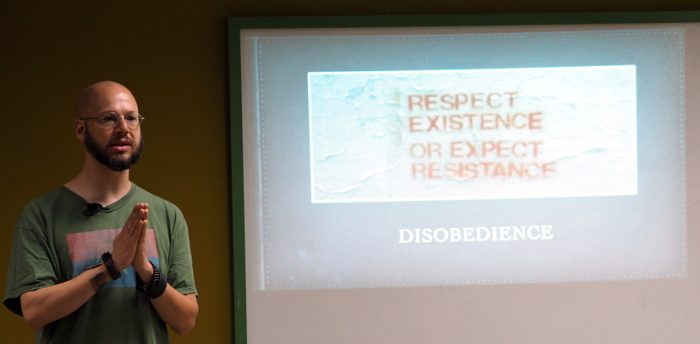
The second day started with the meter pegged at full on social justice, with a presentation by Dr. Mixæl S. Laufer, Ph.D., from Four Thieves Vinegar. They are a collective aiming to share information on how to create pharmaceuticals in places where they might not be available. If you live in the US than you probably heard of Martin Shkreli who as CEO of Turing Pharmaceuticals raised prices 5600%, and EpiPen maker Mylan who raised the price of this life saving device several hundred percent just because they could. Laufer showed how you could make your own EpiPen for around $30, among other things.
Now drug companies will say that they have to charge that amount to cover the costs of creating new drugs, but the EpiPen greed demonstrated that wasn’t true. Running health care as a “for profit” enterprise has always seemed inherently wrong due to the incentives being more toward making money versus keeping people healthy, but that is commentary for another time and place.
I had to leave after that presentation for something special. I make classic cocktails as a hobby, and one of our hosts asked me to speak to a school for bartenders (cantineros) on the great tradition of Cuba cocktails. It was a blast and I’ll write that up soon.
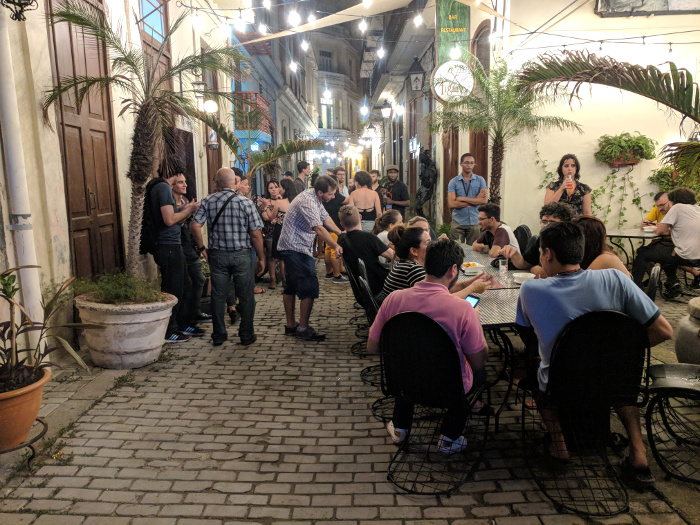
Wednesday night’s event was held, appropriately, at a bar in an area called Barber’s Alley. It was a fun gathering and I got a nice picture of some of our hosts.

Left to right is Jessy, Pablo, pb, and Adalberto.
There was also a guy there who made pipes, specifically replicas of native American peace pipes, and one was passed around.
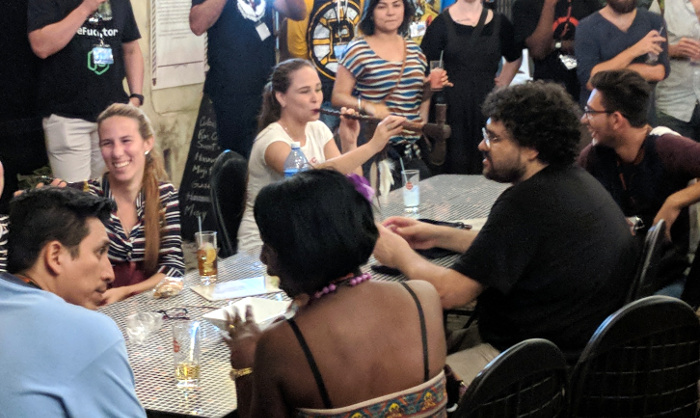
The third and final day was a series of workshops, but was started with a keynote from Ailin Febles, from the Uniōn de Informāticas de Cuba, a non-profit organization to bring together “all technicians, professionals and people related to information and communication technologies in a space that enables mutual support of the associates in the achievement of their professional, academic, scientific, cultural and personal objectives”.
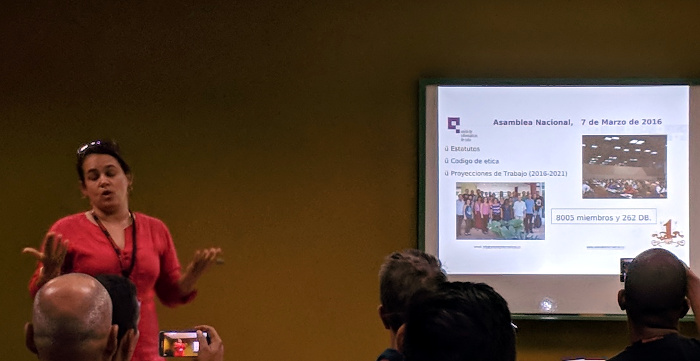
Of course, a lot of their organization is driven by open source software.
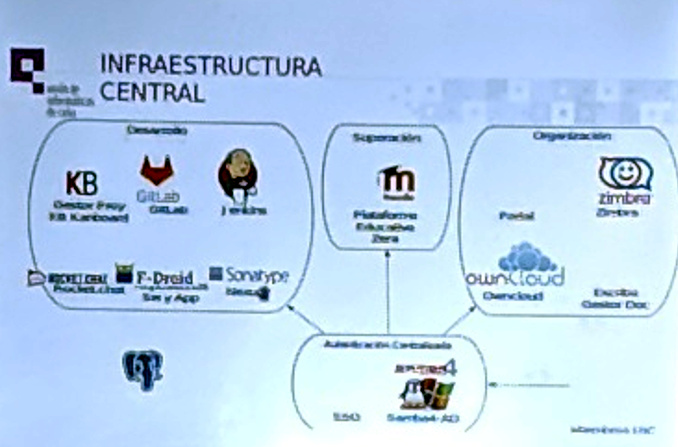
I hope they switch to Nextcloud from Owncloud soon.
There was one morning workshop in English, ironically by a German named Christian Weilbach, on machine learning. I was interested in the topic since I keep hearing about it lately, and the fact that I would probably be able to understand it was a plus. To me machine learning is magic, and I wanted to dispel some of that magic.
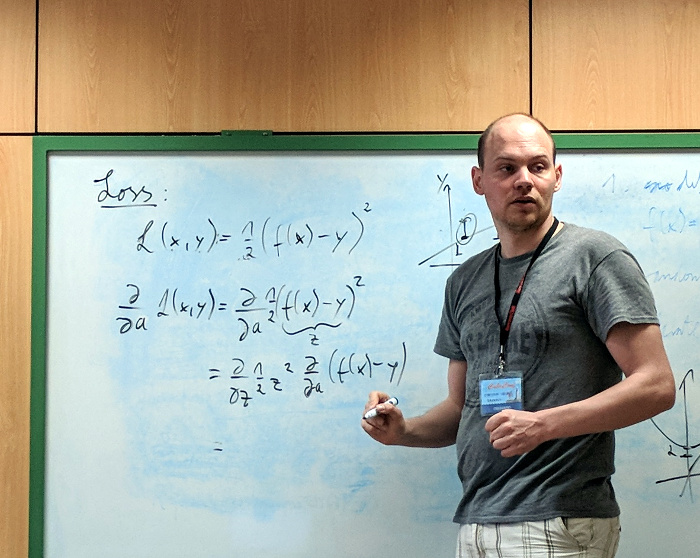
It worked. It turns out that machine learning is, to a large extent, what we used to call linear algebra. It just is able to work on much larger and more complex data sets. I’m still eager to play more with this technology, but it was nice to learn that it really isn’t all that new.

After lunch we decided to spend our last afternoon exploring Havana a bit.

The final evening event was in a brewery, and I enjoyed the beer. What I enjoyed more was the opportunity to talk with Inaury about race in Cuba. Cubans come in all shapes and sizes, from people with light skin, blond hair and blue eyes to people so dark they are almost blue, yet they all seem to interact and socialize with each other more so than any other place I’ve been. I plan to chat more about that in a blog post as well.
Overall I had a great time in Cuba. I love the fact that working in free software means I can make new friends in almost any country, and that even a place with limited resources can put on a great conference. If you get a chance to go to Cubaconf, you should take it.